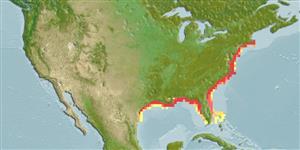Teleostei (teleosts) >
Atheriniformes (Silversides) >
Atherinopsidae (Neotropical silversides) > Menidiinae
Etymology: Menidia: Greek, menoeides, -es, -es = like a half noon shape (Ref. 45335); beryllina: beryllina meaning emerald color (Ref. 10294).
More on author: Cope.
Environment: milieu / climate zone / depth range / distribution range
Ecology
Marine; freshwater; brackish; pelagic-neritic; depth range 0 - 30 m (Ref. 108940). Subtropical; 42°N - 25°N, 98°W - 70°W
Western Atlantic: Massachusetts to southern Florida in USA and around Gulf of Mexico to northeastern Mexico.
Size / Weight / Age
Maturity: Lm ? range ? - ? cm
Max length : 15.0 cm TL male/unsexed; (Ref. 5723); common length : 7.8 cm TL male/unsexed; (Ref. 12193); max. reported age: 2.00 years (Ref. 72478)
A brackish/marine species that ascends rivers (Ref. 86798). In fresh water, usually occurs at the surface of clear, quiet water over sand or gravel. Some landlocked populations, many of which have been established in impoundments as forage for sport fishes, reproduce in fresh water (Ref. 5723). Feeds on zooplankton (Ref. 10294), invertebrates, fish eggs and larvae and diatoms (Ref. 93252).
Life cycle and mating behavior
Maturity | Reproduction | Spawning | Eggs | Fecundity | Larvae
Robins, C.R. and G.C. Ray, 1986. A field guide to Atlantic coast fishes of North America. Houghton Mifflin Company, Boston, U.S.A. 354 p. (Ref. 7251)
IUCN Red List Status (Ref. 130435: Version 2024-1)
Threat to humans
Harmless
Human uses
Fisheries: commercial
Tools
Special reports
Download XML
Internet sources
Estimates based on models
Preferred temperature (Ref.
123201): 12.7 - 26.1, mean 23.7 °C (based on 181 cells).
Phylogenetic diversity index (Ref.
82804): PD
50 = 0.5039 [Uniqueness, from 0.5 = low to 2.0 = high].
Bayesian length-weight: a=0.00550 (0.00248 - 0.01216), b=3.09 (2.90 - 3.28), in cm total length, based on LWR estimates for this (Sub)family-body shape (Ref.
93245).
Trophic level (Ref.
69278): 3.2 ±0.3 se; based on size and trophs of closest relatives
Resilience (Ref.
120179): High, minimum population doubling time less than 15 months (tmax=1).
Fishing Vulnerability (Ref.
59153): Low vulnerability (10 of 100).
Nutrients (Ref.
124155): Calcium = 206 [121, 411] mg/100g; Iron = 2.03 [1.22, 3.31] mg/100g; Protein = 19.2 [16.9, 21.9] %; Omega3 = 0.373 [0.168, 0.930] g/100g; Selenium = 16.1 [7.7, 34.4] μg/100g; VitaminA = 24 [9, 63] μg/100g; Zinc = 1.42 [0.99, 2.00] mg/100g (wet weight);
